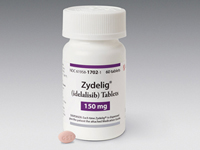Gilead Sciences' ($GILD) move into the cancer business has hit a snag. The company stopped 6 Zydelig trials on Monday after reports of serious side effects--including multiple deaths--among participants in several of the studies.
 The studies were testing Zydelig (idelalisib) in newly diagnosed leukemia and lymphoma patients, as part of Gilead's bid to expand use of the blood cancer therapy, and used the drug in combination with a variety of other therapies. Zydelig is now designated for people who've relapsed after previous treatment.
The studies were testing Zydelig (idelalisib) in newly diagnosed leukemia and lymphoma patients, as part of Gilead's bid to expand use of the blood cancer therapy, and used the drug in combination with a variety of other therapies. Zydelig is now designated for people who've relapsed after previous treatment.
Gilead said it would also stop other programs using Zydelig as a first-line therapy.
Regulators on both sides of the Atlantic are looking into the data. European officials announced a review Friday, and the FDA sent out an alert Monday.
"The FDA is reviewing the findings of the clinical trials and will communicate new information as necessary," the agency said in its alert.
Zydelig's FDA-approved indications cover chronic lymphocytic leukemia--where the Gilead drug is used alongside Roche's ($RHHBY) Rituxan--and as a solo treatment for two types of lymphoma. The halted trials involved previously untreated patients with the same cancers and used Zydelig in drug combinations that aren't yet approved.
In the short term, the halted trials won't have much effect on Zydelig's prospects, because its current approvals remain intact, Leerink Partners analyst Geoffrey Porges said in a note to investors. But the red flags on Zydelig combinations are likely to nip long-term growth in the bud, because combining drugs is standard practice in these diseases, he wrote.
A dominant player in antiviral meds, with megablockbuster hepatitis C treatments and multibillion-dollar sellers in HIV, Gilead has been working to branch out, and Zydelig is one of those efforts. The drug delivered some impressive results in chronic lymphocytic leukemia
Zydelig is a first-in-class PI3k inhibitor, and it was armed with some impressive data for its July 2014 launch in CLL, indolent B-cell non-Hodgkin's lymphoma and small lymphocytic lymphoma (SLL). For instance, adding the drug to Roche's Rituxan, a standard CLL treatment, held off cancer growth twice as long as Rituxan alone: 10.7 months compared with 5.5 months. Several recent--and very successful--cancer launches delivered far less, so blockbuster sales estimates were common among analysts; EvaluatePharma put Zydelig sales at $1.2 billion by 2020, and some analysts went as far as to predict $1.5 billion by 2017. The drug brought in $132 million last year.
But Zydelig faces formidable competition. Johnson & Johnson ($JNJ) and AbbVie's ($ABBV) Imbruvica (ibrutinib) charged into leukemia and lymphoma and quickly charted blockbuster sales; now, analysts figure it's on its way to a potential peak of $12 billion. That's Zydelig's head-to-head rival. More of that could be coming, in the form of AbbVie's ABT-199, an add-on for Rituxan and Imbruvica itself.
"These decisions by Gilead and the regulators effectively mean that Zydelig is dead in the water," Porges wrote, "since it can no longer be used in the preferred combinations and in the most common patient populations. It also finally resolves the Zydelig vs Imbruvica debate--clearly in favor of Imbruvica."
- read the FDA alert
Special Reports: Top 10 best-selling cancer drugs of 2013 - Rituxan | Top 20 orphan drugs by 2018 - Ibrutinib